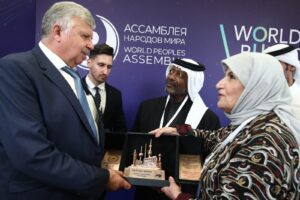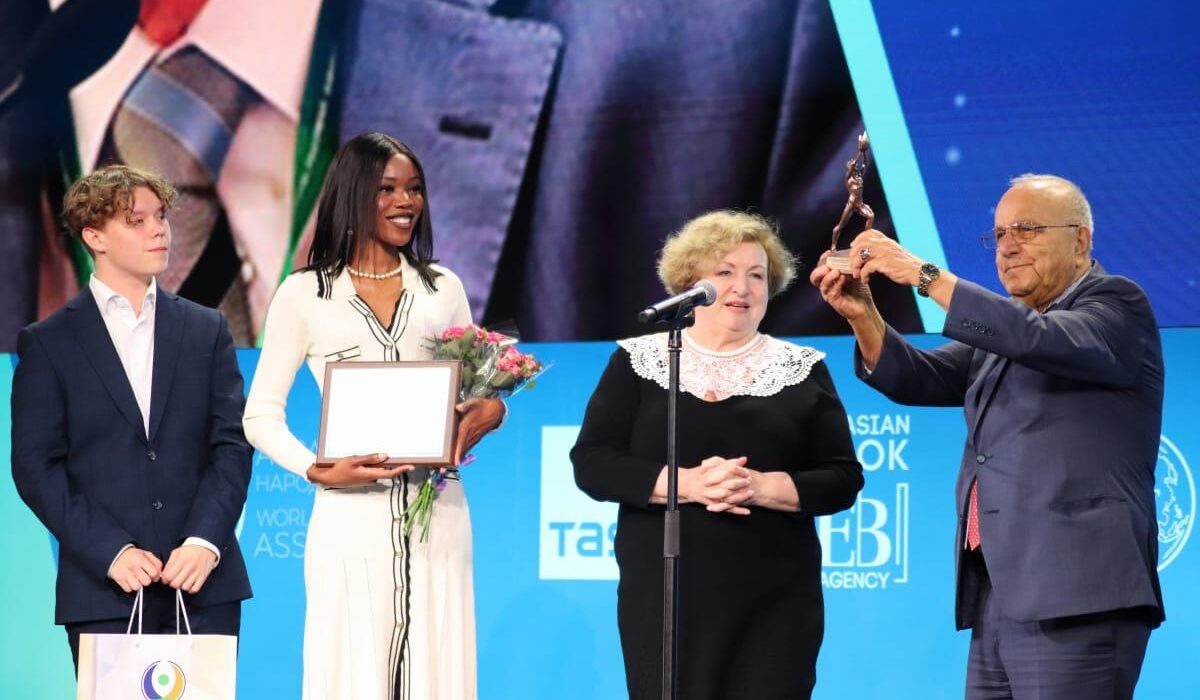
The First ever World Public Assembly has redefined a new model of development as the “economy of life” and further highlighted the role of travel in building bridges
The Assembly became the center of global dialogue. Over 4,000 participants from more than 150 countries: politicians and diplomats, entrepreneurs and cultural figures, writers and scientists, representatives of educational organizations, religious and social movements gathered to discuss the future of humanity.
The central idea of the World Public Assembly was to build a “New World of Conscious Unity”, a world where the main value is man. The main vectors of international dialogue and partnership have been formed.
Award “For Service to Humanity”: A Symbol of Gratitude of Nations
On the International Day of Peace, September 21, a historic event took place — for the first time, the Public Recognition Award “For Service to Humanity” was presented. Its first laureates are representatives of Russia, Jordan, Tajikistan, Kazakhstan, Angola, India and the United Kingdom.
The awards were presented to: Russian philosopher, writer, public figure Alexandra Ochirova, former Prime Minister of Jordan Adnan Badran, former Secretary General of the Shanghai Cooperation Organization Rashid Alimov, Kazakh composer Tolegen Mukhamedzhanov, public figure Sabena Johannes, Chairman of the Council of the Association of Russian Diplomats Igor Khalevinsky,representative of the Indian National Congress Dalbir Singh, Professor Bhai Sahib Mohinder Singh Ahluwalia.
These names sounded like a symbol of spiritual leadership and humanism.
“No one in the world can resist united minds,” concluded UNESCO Goodwill Ambassador Alexandra Ochirova.
“We must awake as one,” said Madame Sabena Johannes, founder of Afritrack Angola, quoting her “Voice of Reason” Appeal to humanity, which she sent to the Assembly participants.
The Economy of Life: Trust as a Foundation
The current global situation is characterized by a sharp increase in geopolitical, economic and humanitarian challenges. Disunity between states is intensifying, trust deficits are growing, and competition between value systems and development models is intensifying. In these circumstances, the role of public diplomacy, humanitarian cooperation, and public and cultural initiatives that can offer an alternative architecture for peaceful coexistence is of particular importance.
At the WPA discussion platforms devoted to the economic sphere, the main idea was that it is possible to effectively develop economies only by developing trust between people. International partnership must have a humanitarian basis. Experts from different countries agreed that the new model of development is the “economy of life.” “Economics begins with the search for meanings. It is based on a human being,”said Svetozar Darnev, Head of the Russian association Osnova.
The topic of the role of modern media in shaping the new architecture of the world was particularly acute in the discussions. “Today the cognitive goes against all nations, against spirituality. The media must return the cultural code to us,” said Russian journalist Oleg Yasinsky. Argentine film director Silvana Yarmolyukrecalled the power of cinema, and producer Olga Azhnakina recalled the importance of glorifying creative work.
The experts of the peacekeeping sites discussed the ways to overcome conflicts on the planet. “When the economy comes first, rather than people, it becomes the cause of all wars,” said Alexander Usanin, professor at the Academy of Geopolitical Problems. Holger Thorsten Schubert, President of the Neutrino Energy Group, emphasized: “Whoever controls energy controls peoples.” But the experts also pointed out that the solution lies in science and technology.
The Second Congress of the World Organization of Writers (WOW) attracted special attention. Writers from more than 60 countries discussed creative issues, translations, book fairs, support for young authors, and more. One of the central places in the discussions was occupied by the use of artificial intelligence. “We can use AI as a tool, but we can’t rely on it. Otherwise, we give up emotionality,” said Aminur Rahman, a poet from Bangladesh.
A special point in the award ceremony was the presentation of the honorary badge “People’s Diplomat” of the SCO Public Diplomacy Center in Uzbekistan. The badge was awarded to Natalia Zabolotskikh, Program Director of the World Public Assembly and coordinator of the “Leader of PublicDiplomacy” Contest.
Agreement in Worldview Reflects Agreement in Actions
An unprecedented number of cooperation agreements were signed on the sidelines of the First World Public Assembly. 71 documents were signed by representatives of Brazil, the Vatican, Germany, Mexico, Turkey, Uruguay and other countries.
Of these, 35 agreements with non-profit organizations representing 16 countries were signed by the World Public Assembly.
The WPA partners signed 36 agreements on the sidelines of a large-scale public forum.
WPA Final Documents
The outcomes of the First World Public Assembly will be four main documents reflecting its spirit.
“We call on peoples, governments, businesses and civil society to abandon the rhetoric of hostility and confrontation,” says the Declaration of the WPA”New World of Conscious Unity.”
“This Declaration proclaims the new goal of humanity — the building of a New World of Conscious Unity, where the happiness of everyone is inextricably linked to the well—being of all,” the Declaration on Happiness states.
“Conscious unity is not a utopia, but a practical choice. The choice we are making today. Together,” the Manifesto of Conscious Unity proclaims.
The Second World Public Assembly will be held in Austria, in Vienna, Secretary General of the World Peoples’ Assembly Andrey Belyaninov said at the closing ceremony of the WPA.






